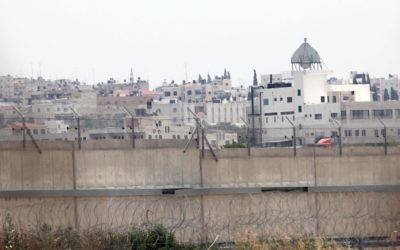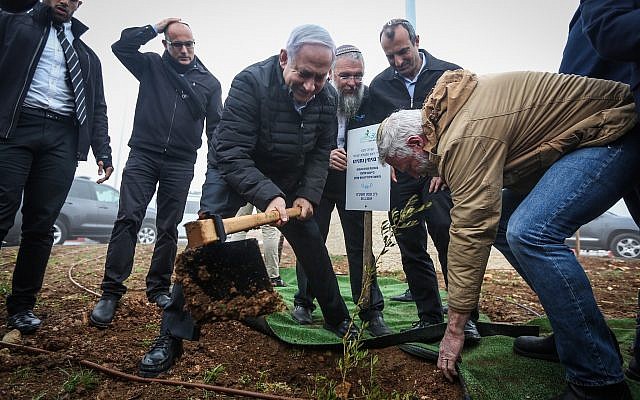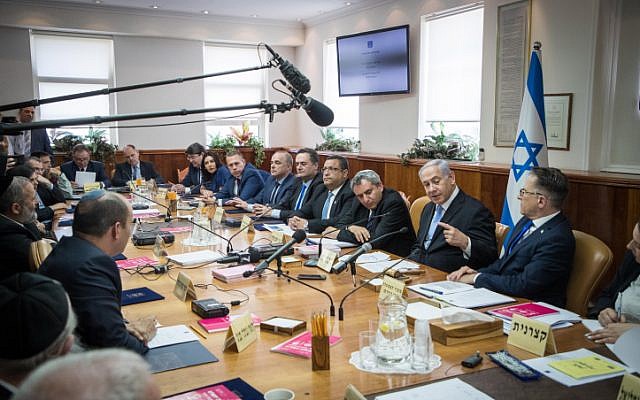Netanyahu pushing rare building permits in Area C under US pressure ahead of peace plan unveiling; right criticizes plan, but URWP’s Smotrich accepts it
By MICHAEL BACHNER and JACOB MAGID, TOI
A plan introduced by Prime Minister Benjamin Netanyahu for building permits in the Israeli-controlled Area C of the West Bank involves the approval of 6,000 settlement homes alongside 700 housing units for Palestinians, a government official confirmed on Tuesday.
After two lengthy meetings of the high-level security cabinet on Sunday and Monday, the ministerial body has yet to reach an agreement on the politically sensitive matter, a spokesman for one of the minister’s present said, confirming a Kan public broadcaster report.
Palestinians are rarely granted building permits in Area C and recent years have seen the total number of approvals remain in the single digits, compared to the thousands green-lighted for Israeli settlers.
It wasn’t clear whether the permits are for new construction or buildings currently slated for demolition.
The developments came days before a US delegation led by senior White House adviser Jared Kushner is slated to arrive in Israel and other countries in the region in order to promote US President Donald Trump’s administration’s peace plan.
Kan quoted ministers on Monday saying the matter was “extremely sensitive,” but didn’t say whether it was linked to the US peace plan. On Tuesday, Haaretz quoted political sources as estimating that Netanyahu was promoting the plan under pressure from Washington.
Some right-wing public officials criticized the plan, although a hawkish minister and a local settlement leader expressed support for it.
“For 20 years, there has been a plan that aims to take over and seize Area C by land development,” charged MK Moti Yogev of the United Right alliance of religious right-wing parties, in an interview with Army Radio. “The Palestinians have built structures on a massive scale, so we must enforce the law on this illegal construction.”

“This is a reward for the Palestinian Authority, which is anyway changing the reality on the ground in Area C,” Channel 12 quoted unnamed right-wing sources as saying. “The leadership has been very selective about enforcing the law.”
However, Transportation Minister Bezalel Smotrich, a staunchly hawkish member of the security cabinet, did not express objection to the plan in an interview with Kan.
Smotrich claimed there was no link between the permits for Palestinians and the settlement construction, adding that “Israel should and needs to approve Palestinian planning and construction only from a perspective of what is good for us.
“We have a commitment to Palestinians who lived in the area before 1994,” he said, referring to the 1994 Oslo Accords which defined certain areas of the West Bank as Area C, where most of the Jewish settlements are located and where Israel has full control over security and civilian matters.

Itamar Ben Gvir of the far-right Otzma Yehudit party reacted to Smotrich’s interview by tweeting, “Now do you understand why we must have Otzma Yehudit in the Knesset?”
Also supporting the plan was the head of a settlement local council.
“I support the prime minister’s stance of giving Palestinians building permits in Judea and Samaria, but it must be done alongside strict and uncompromising enforcement against illegal construction,” Oded Revivi, head of the Efrat council, said in a statement.
Revivi called for “massive” settlement construction, saying for years there has largely been a freeze on permits. He added, though, that he had no desire to “strangle” Palestinians’ lives.
Likud MK Gideon Sa’ar told Kan that he didn’t know what happened in the cabinet discussion, but slammed the “out of control illegal Palestinian construction in Area C with European funding with the goal of strangling the settlements and taking over the land, and we must fight it.”
On Monday night, Yesha settlement umbrella council chairman Hananel Dorani said that “instead of fighting against the Palestinian Authority’s takeover of Area C and destroying the illegal construction that is rampant there, the prime minister is raising the possibility of surrendering to the phenomenon and approving the illegal construction, and perhaps even approving further construction. We fully oppose this and call on the ministers of the security cabinet to oppose this proposal.”
It was not immediately clear why Netanyahu, who is also defense minister, brought the plan to a security cabinet discussion, given that only his approval is required (followed by that of a bureaucratic body within the Defense Ministry) for the granting of building permits in the West Bank.
A spokesman for the Prime Minister’s Office did not respond to a request for comment.

As Israel girds for elections in September, several right-wing parties have vowed to prevent Palestinian expansion in areas of the West Bank that they hope Israel will annex.
The last time a plan for Palestinian building permits was brought for its approval, the security cabinet froze it indefinitely. That plan related to the expansion of the Palestinian city of Qalqilya, just bordering the Green Line. Then-defense minister Avigdor Liberman had introduced the proposal in 2017, hoping to allow for the crowded Palestinian city surrounded almost entirely by the security barrier to expand within the space still available.
But after settler leaders got wind of the program, they launched a campaign to pressure ministers to refrain from “rewarding terror” and managed to bring the plan to its knees.
The Civil Administration’s High Planning Subcommittee — the Defense Ministry bureaucratic body that authorizes West Bank construction — had been slated to convene this month to advance the latest batch of settlement building, as the subcommittee does four times a year. However, that meeting has yet to take place.
According to the Oslo Accords, Israel has full military and administrative control over Area C, which comprises about 60 percent of the West Bank’s territory.




“Palestinians are rarely granted building permits in Area C and recent years have seen the total number of approvals remain in the single digits,”
Palestinians do not ask for building permits in Area C — they accept the money offered to them by the EU on the pretext of “humanitarian assistance” and then go ahead and build anywhere thy want in Area C. There is plenty of room for them to build in Areas A and B but they already control both those areas, thanks to the asinine decisions taken at the signing of the Oslo Accords. But Area C is entirely controlled by Israel and that is where the Palestinians aim to control next by extensive building in the area.
And the Israeli government does zilch to stop this any of this illegal activity — in fact they have now voted to accept and approve it. I give up!
Time to remove words given in favour to the illegal sodomites. Settlements, settlers, west bank.
Next will future gov. leaders accept Haifa, afula as settlements in the north bank? Do the Jews in Judah and Samaria pay income, property tax to State of Israel? Do they have the right to vote, do idf service? If so they are citizens living in Israeli towns.